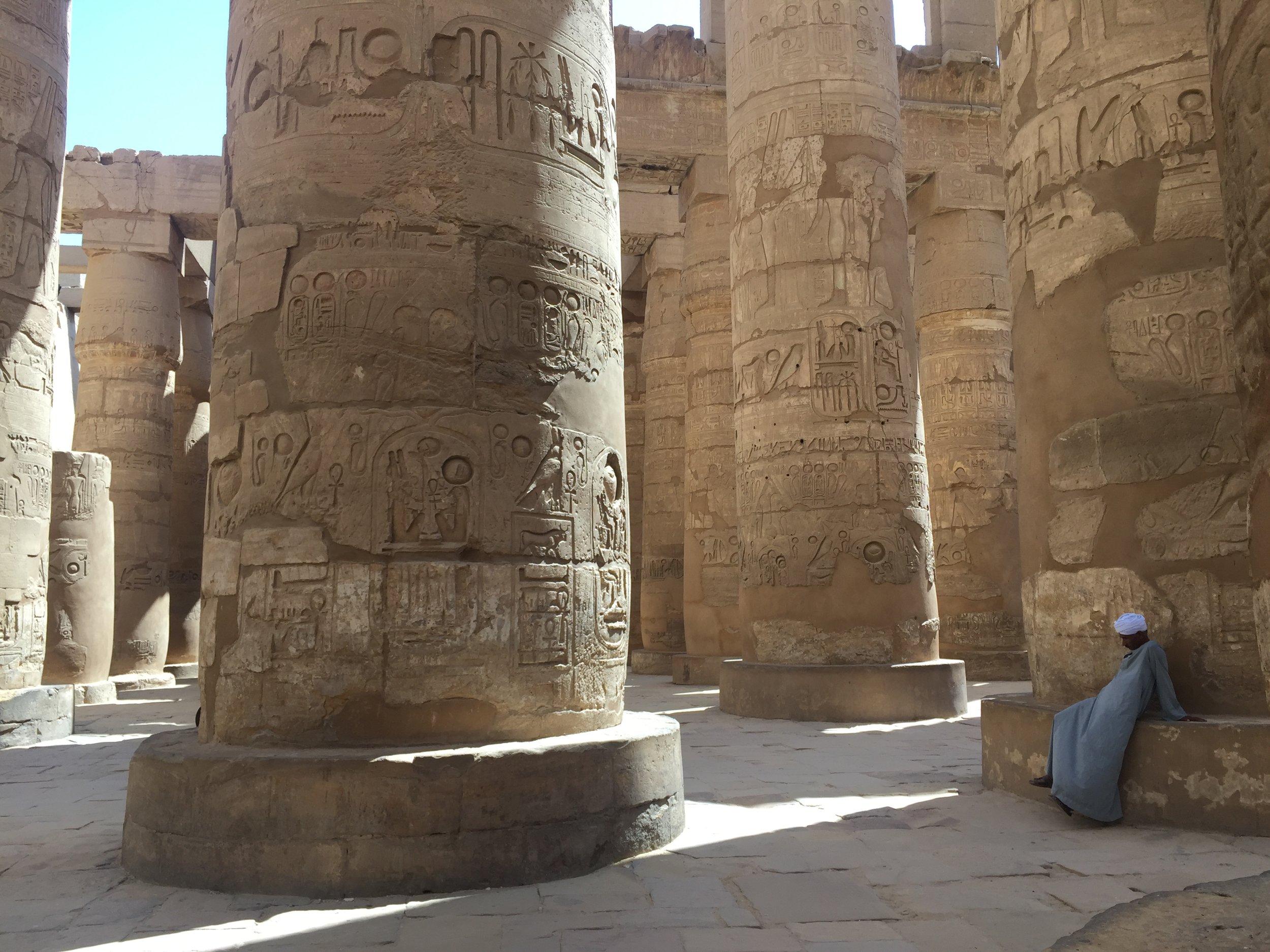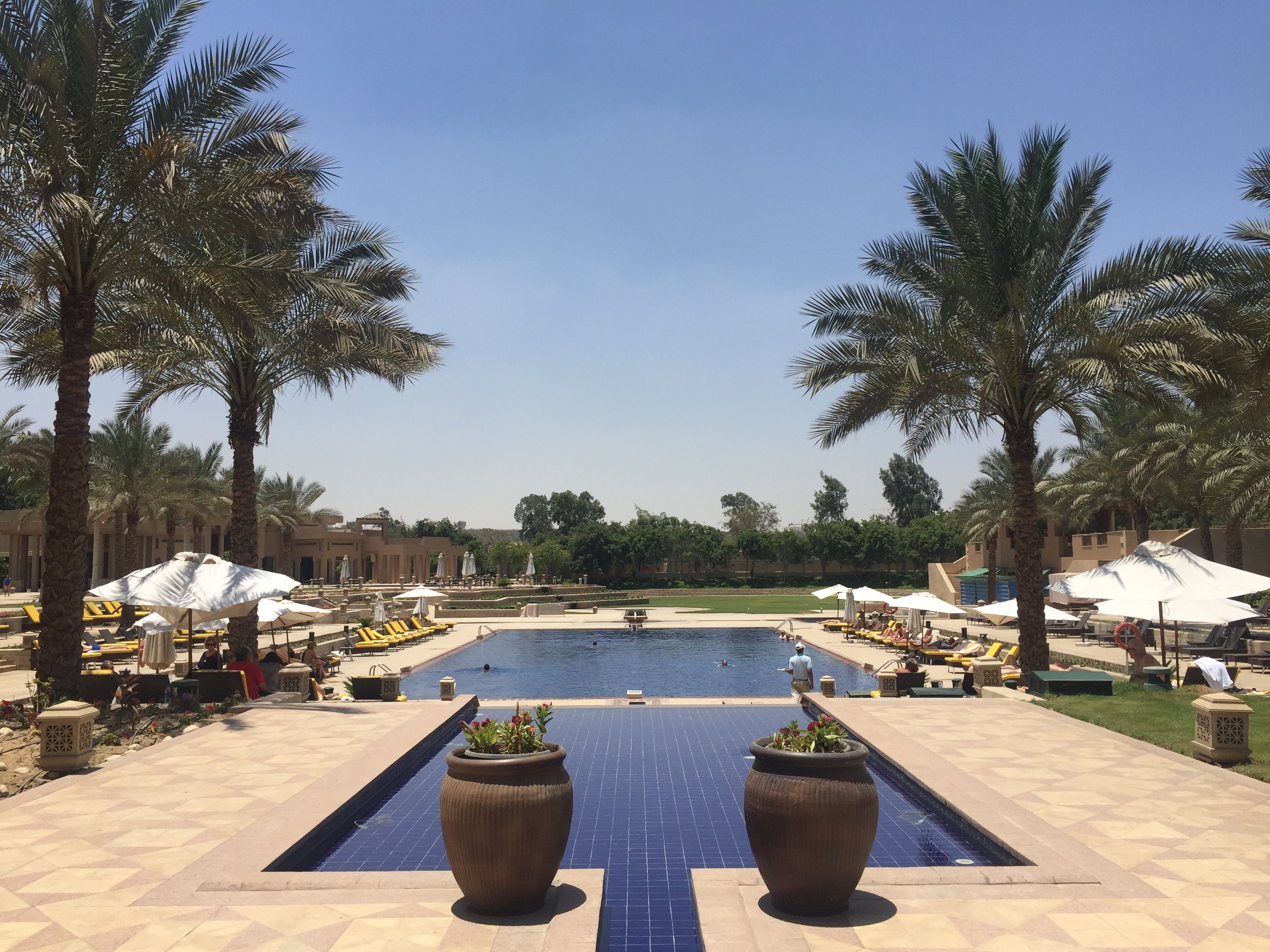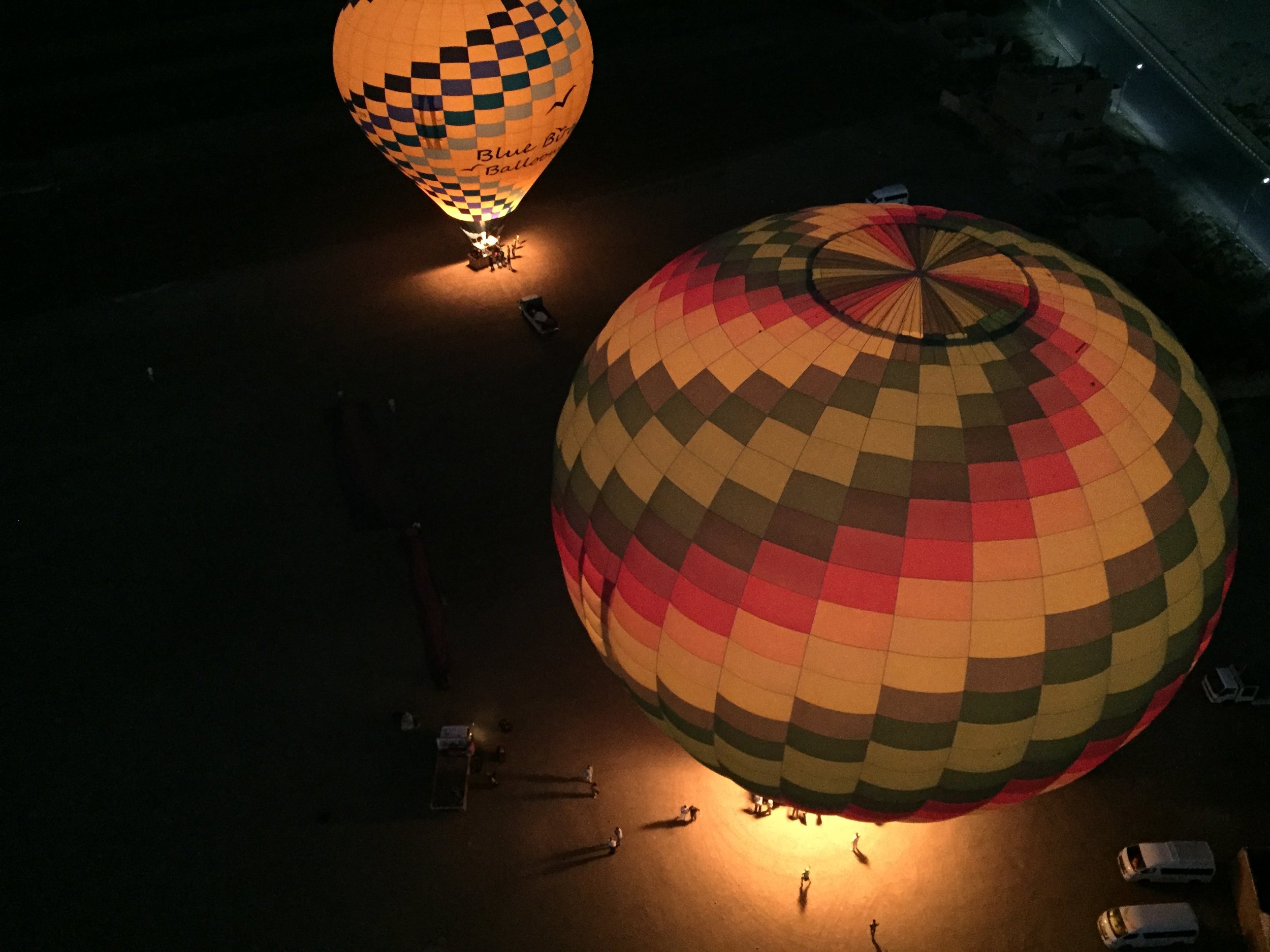Salaam & Shukran
Hi, friends. And family. Hi, mom.
This last stop felt like it should stand alone.
Egypt doesn’t fit with the countries that preceded it - Spain, Uzbekistan - and, despite shared geography and language, is a far cry from our next stop in Jordan.
Plus there’s a lot to say.
This is the first time we’ve considered tiptoeing around in our write-up. About being diplomatic more than candid. But that feels strangely patronizing, and for anyone considering a trip to Egypt, renders these things useless.
Our experience was colored by two influences: a heatwave in a muslim country during the middle of Ramadan, first; and second, our Bay Area Egyptian friend Seif who opened many locked doors.
A fitting start for an equally warm and aggravating place.
Onward.
Where we’ve been: Egypt
How long we stayed: 8 days
Hello: Salaam (“sa-lahm”)
Thank you: Shukran (“show-cron”)
Where we’re headed next: Jordan, Israel
Deplaning in Cairo, Meredith’s first words were whispered:
“Here we go.”
So much of this country’s history has been shaped and reshaped over millennia, but the cynicism haunting Egypt today is decidedly recent: the product of a revolution, safety issues and bad press.
Mere was reluctant to tell her mom we were going, I’d checked the State Department’s website for the first time all year, and our palms were sweaty as our Egypt Air flight touched down in the dark sands of the capital at night.
Hot wind. A calm, large, unadorned terminal. A hundred West African muslims huddled in the deplaning area.
We walked up the staircase from the tarmac and did a double take: a man in a perfectly pressed suit held a sign that read, “MEREDITH BLACKWELL.” Waaaaay ahead of the security checkpoint. He shook our hands, said he was a friend of Seif's, whisked us through the visa process, cut the line at immigration with a dismissive wrist flick, and had us sit while he picked up our bags from the carousel.
What’s happening?
The well-dressed man wheeled our luggage to a waiting car, we got a phone call from Seif’s mom who mentioned that she’d upgraded our hotel room in Giza, and an hour later we were on a balcony staring at the Great Pyramids lit up for Ramadan.
If we could wish one thing for everyone landing in Egypt, it’s this reception. The fear Egyptians know is brought into their country heavier than luggage evaporates when it feels like strangers are looking out for you. It’s the warmest welcome of any we’ve received this year. The product of genuinely giving people and the country’s overwhelming urge to make visitors feel at ease again in a world they once ruled.
Three quick scenes:
We’re in a taxi, careening along a highway through the unfinished complexes of Cairo, and a man on a motorcycle is holding out a panicked little chicken for Meredith to take. Gift giving at 60mph. He edges the motorcycle closer, our taxi backs off. He laughs, stuffs the chick back into a cage he’s strapped to his Suzuki, says something to the unhelmeted 6 year old riding on the back, and burns off into the horizon.
We’re in a massive, empty restaurant at our hotel in Luxor. A waiter is tenting napkins. We look around to see that he’s tented 300 or so napkins in the sprawling, conference-size room. No more than four of us will eat there that day - we’re the hotel’s only guests besides a few businessmen - but he finishes tenting one table for 8 and moves on to the next.
We’re on a slow, creaking boat cruise sailing the Nile River north from Aswan. A large Japanese tour group has gotten very into the Egyptian theme and one giggling couple comes down to dinner that night in traditional pharaoh garb. The husband is especially adorned, in bright blue silk with shining gold accents. Our guide mumbles something to himself: “He’s wearing a woman’s dress.” Mere laughs: “That happen a lot?” Guide: “All the time.”
When we were kids, we cut out pyramids in Mrs. Knowland’s class for history dioramas. We fashioned cartouches for our names, translated elementary hieroglyphs and memorized the three kingdoms.
It all felt distant and intangible.
Ten minutes in Egypt, and the 5,000 years of history they’ve embalmed and impossibly preserved are right there in front of you. To be seen, and, to the dismay of preservationists, touched.
Maybe it’s because we’re American, but 5,000 years hits you hard in the face. At home, we cordon off and plaque anything that’s a few hundred years old. Egypt sneezes and two centuries of Julius Caesar, Brutus and Cleopatra fall out.
We didn’t know this until we got there, but you can actually walk inside the tomb of the Great Pyramid. $5 on top of the entrance ticket lets you hunch through a small door close to the pyramid’s base, up a cramped stone incline and into the actual burial chamber that’s long ago been robbed of the treasures inside. Everything is original, and as you press your back against the 70-ton granite slabs forming the chamber, it’s cold to the touch. Most people look around confused - eyes wandering for the sarcophagus, mummy and canopic jars that aren’t there - then walk out.
What’s weirdest is that the pyramids aren’t even Egypt’s most stunning relic. Luxor itself is an entire preserved royal city. Tombs of kings built into the mountainsides have retained the color and inscriptions etched into them 3,000 years ago. A temple that was once buried in the sand became a Coptic church, which in turn was buried in the sand and became a fully functioning mosque. A place of continuous worship for over 2,000 years - one of the few left on earth.
It struck us that all of this must feel especially strange to the man tenting napkins. His country is drowning in artifacts from eras when it was the world’s great superpower. A superpower in which citizenship commanded reverence. And now the hotel he works in to service this history is empty, people too afraid to visit.
Yet despite all of it, this lull feels temporary for Egypt.
Having seen kingdoms rise, fall and rise again; having watched the Greeks rewrite their history before Romans did the same; having watched Cleopatra woo and discard suitors to retain the throne: Egyptians exude an attitude that any downswing will have an equal and opposite upswing.
As though they’re living only one of many iterations to come.
Q&A
Incomplete answers to complicated questions we’ve gotten.
Q: Is Egypt safe?
A: For foreigners, definitely. The country fiercely protects its tourists. Nearly every incident effects other Egyptians, in areas travelers rarely visit.
Q: Are tourists hassled aggressively?
A: Yep.
Q: Is it expensive?
A: A 30-minute taxi to the train station cost us about a dollar.
Q: Did the food make you sick?
A: Never. Say yes to sugar cane juice, feteer, um ali and lemon tea with mint.
Q: Would you go back?
A: Not in the summer, and probably not during Ramadan.
A sparkling Jeep pulls up to the Mena House in Giza. A guy in the back has the oversized specs of a Mission District fixie rider, the two guys up front are still in make-up from a comedy sketch they were filming out in the desert.
Friends of Seif's sent once again to welcome us.
The driver, Gamroor: “We’re going to park at my place and then go out. Cool?”
Very.
Until then, Cairo had been quiet for a city of 23 million. We’d seen satellites clinging to the apartment buildings, televisions glowing, and assumed the city had shut down for Ramadan. Which was partly true. Shops closed by mid-afternoon nearly everywhere, fasting in 107F heat made people both irritable and scarce, and businesses were operating, according to one cab driver, at “about 25 percentages.”
But then we jumped in an Uber with Gamroor, Hoezy, and Safi and soon we were in the chaos we’d dreamt of experiencing in Egypt: the chatter of people in every crevice of Khan el-Khalili, the call to prayer echoing from an enormous mosque, a silversmith hammering into a large serving platter, roasted nuts sizzling atop oil drums, the smell of shisha smoke, cardamom and cotton candy.
Four hours with these three confirmed that traveling alone on the tourist route in Egypt during Ramadan will yield precisely the results you’d expect: a dispiriting quiet amidst incredible antiquities. Find your way into the car with a group of likeminded locals, though, and the country opens up. Exchanges wavered from breezy film reviews to debates over foreign policy. Arab Spring to Arab kitchens. Working for Netflix to working at Google. Smiles came easily. The food arrived in heaps of feteer, kushari, and ros bel laban.
How do we make this happen everywhere? TripAdvisor offers a million reviews. Airbnb offers a stranger’s house. Nothing seems to offer likeminded people.
Maybe we need to start something.
We saw a piece of graffiti on Edfu Temple in the middle of the southern Nile. It had been etched into a pillar by a French soldier. Nothing more than the guy’s name, and then, down below it, the year:
1823.
It was the kind of thing a high schooler would etch into a bathroom stall, but this had survived both world wars and two centuries.
It reminded us of the opening line from Luxor’s nightly lightshow. Lasers and spotlights whirl around Karnak Temple, illuminating a pair of giant statues of Ramses II, and a voiceover booms dramatically:
“MAN IS AFRAID OF TIME… AND TIME… TIME IS AFRAID OF EGYPT!”
Indeed.
ITINERARY
Cairo
To make sense of it, find a local. Otherwise you go to Tahrir Square for the stunning Egyptian Museum, drive in circles past enormous mosques and dusty, unfinished apartment complexes, and generally feel lost. For us, dinner in Khan el-Khalili at night was incredible.
Giza
Home to the last remaining Ancient Wonder and 97% of why most tourists visit Egypt in the first place. Get there early - prices for camel rides around the pyramids go up quickly, as does the heat, and hunching into Khufu’s tomb can be claustrophobic even with just a few people inside. A guide is compulsory, and if you get a good one, you’ll learn wonderfully cool facts. For example, “Sahara” means “desert,” so you don’t don’t have to say “Sahara Desert.” Or this one: the circumference of the Great Pyramid divided by the height equals pi. And this one: if you take all the stones used to build Khufu's Pyramid and lay them side by side, it encircles France in a wall 3 meters high.
Aswan
We took the sleeper train from Giza to Aswan, which was weirdly cool. Quarters are tight, but they feed you twice, beds are made up, and the views are great. In Aswan, everyone is eager to show you the Aswan Dam, which is little more than exaggerated propaganda. Edfu Temple is worth the little boat ride to get there.
Nile River Cruise
Our 3-night Nile River cruise from Aswan to Luxor was sleepy, but floating the Nile is romantic and pretty. Go for the fanciest cruise ship. They’re all cheap as it is, the food is good and the rooms are huge.
Luxor
An absolutely-do-not-miss city of temples and tombs. Doesn’t matter if you don’t like antiquities or haven’t brushed up on your history - it’s stunning. A great guide will bring it all to life. Or, a guide like ours will do the opposite and be aggravating at the same time. If someone asks you to do a balloon ride "on sale," fight intuition and do it anyway. Luxor at dawn is incredible.
In the wake of the Supreme Court’s decision to partially uphold the muslim travel ban, we hope these newsletters reflect our belief that travel is important.
The most effective way to combat xenophobia as exists in the world, we’d say.
Certainly not everyone in every country means well. That’s as true in violence-battered America as it is in violence-battered Egypt.
But people continue to shape our experiences abroad, and in doing so, they remind us that the good eggs outweigh the bad absolutely everywhere. By such an overwhelming majority that wrapping bigotry in a piece of unilateral legislation should be considered an act of cowardice that only makes Americans, and others, less safe. Letting that legislation stand, moreover, while 9 unelected octogenarians take a summer break and doodle in each other’s yearbooks only undermines our necessary confidence in the Court’s authority.
Travel.
And on that note, we’ll write to you after Jordan and Israel wrap up.
We love you.
























